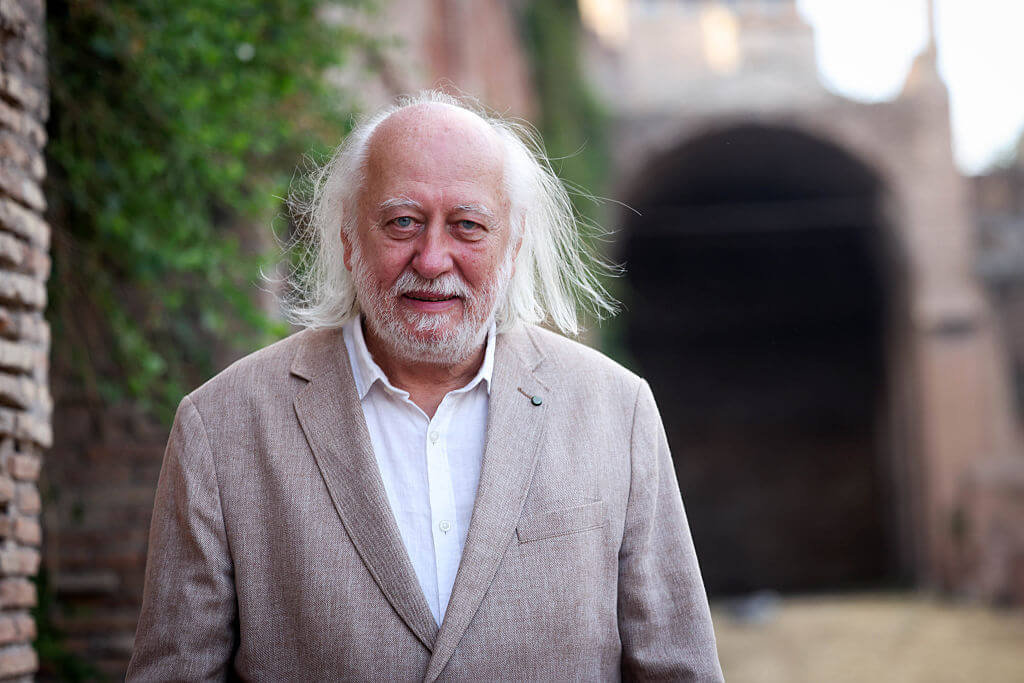László Krasznahorkai, whose family hid Jewish roots during Holocaust, wins literature Nobel
The Hungarian novelist, hailed as a ‘master of apocalypse,’ has spent his career writing about ruin, endurance, and faith

Hungarian novelist László Krasznahorkai in 2005. Photo by Franco Origlia/Getty Images
For decades, Hungarian novelist László Krasznahorkai has written sentences that seem to stretch to the end of time — long, feverish, unpunctuated meditations on chaos, faith, and collapse. Now, the writer once dubbed “the contemporary master of apocalypse” has received the world’s highest literary honor. On Thursday, the Swedish Academy awarded Krasznahorkai, 71, the Nobel Prize in Literature.
Born in 1954 in the small Hungarian town of Gyula to a Jewish family that survived the Holocaust and concealed its identity, Krasznahorkai has spent decades chronicling moral disintegration and spiritual endurance.
If you don’t read Hungarian, you might know Krasznahorkai through film: his longtime collaborator Béla Tarr turned several of his novels into movies — Sátántangó (a seven-hour black-and-white epic), Werckmeister Harmonies, and The Turin Horse — all staples of international art-house cinema.
Who is László Krasznahorkai?
A cult figure in world literature, Krasznahorkai is known for sprawling, hypnotic prose and bleak humor. He first drew attention in 1985 with Sátántangó, a novel about life in a decaying Hungarian village.
He has since written a series of darkly comic epics, including The Melancholy of Resistance and Seiobo There Below — each circling questions of despair and transcendence.
Some of his later novels, including Baron Wenckheim’s Homecoming and Herscht 07769, feature neo-Nazis and right-wing extremists. The latter contains only a single period in 400 pages. The rest is one relentless cascade of clauses — a symbol of his determination to hold chaos together by grammar alone.
He won the Man Booker International Prize in 2015.
How does his Jewish background fit into his work?
Krasznahorkai rarely writes explicitly about Judaism, but the sense of exile, concealment, and moral reckoning runs through his fiction. As antisemitism intensified in the 1930s, his grandfather changed the family name to the more Hungarian-sounding Krasznahorkai. “Our original name was Korin, a Jewish name. With this name, he would never have survived,” the writer told an interviewer in 2018. “My grandfather was very wise.”
Decades later, Krasznahorkai gave the name Korin to the doomed archivist who narrates his 1999 novel War and War — turning family history into fiction. Krasznahorkai didn’t learn about his Jewish ancestry until he was 11, when his father finally told him. “In the socialist era, it was forbidden to mention it,” he recalled.
That buried history gives his novels their haunted tone. In a way, his work continues a Jewish literary tradition: bearing witness in extremity, searching for meaning in ruin.
In that 2018 interview, Krasznahorkai described himself as “half Jewish,” then added darkly: “If things carry on in Hungary as they seem likely to do, I’ll soon be entirely Jewish.”
Do Jews disproportionally win Nobels?
Jews make up about 0.2 percent of the world’s population but have received roughly 20 percent of Nobel Prizes across all categories — a record that spans science, peace, and the arts. That lineage stretches from Albert Einstein, Niels Bohr, and Richard Feynman in physics to Rita Levi-Montalcini and Gertrude Elion in medicine, Milton Friedman and Daniel Kahneman in economics, and Henry Kissinger and Elie Wiesel in peace.
Krasznahorkai now joins that global pantheon — one that also includes Isaac Bashevis Singer, a longtime Forward staff writer, whose Yiddish storytelling won him the 1978 Nobel in Literature.
Who are some other Jewish Nobel laureates in literature?
Louise Glück (2020): The American poet mined family grief and faith, blending autobiography and myth to confront the quiet devastations of ordinary life.
Bob Dylan (2016): The folk legend was honored “for having created new poetic expressions within the great American song tradition.” His Jewish heritage and biblical imagery made his win both celebrated and debated.
Imre Kertész (2002): A Holocaust survivor who was honored in 2002 for Fatelessness, a semi-autobiographical work about a boy in Nazi concentration camps.
Elias Canetti (1981): Born to a Sephardic family in Bulgaria and raised in Vienna, he spent much of his life in exile from fascism. His noted work of nonfiction, Crowds and Power, dissects how mobs become monsters — and how leaders learn to feed them.
Saul Bellow (1976): The Canadian-born American novelist who captured the restless intellect and moral hunger of postwar Jewish life. His novels, including Herzog and The Adventures of Augie March, turned immigrant striving and urban alienation into high art.
JTA contributed to this report.

















